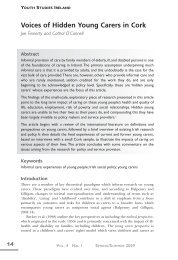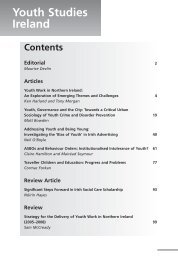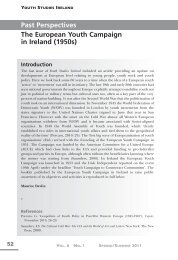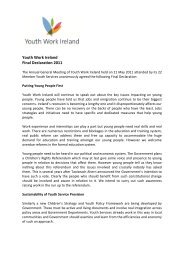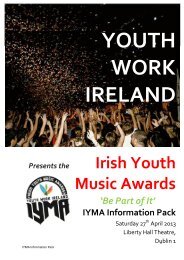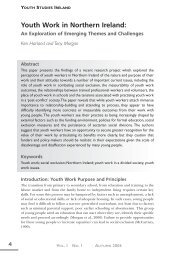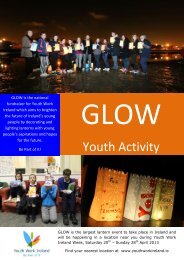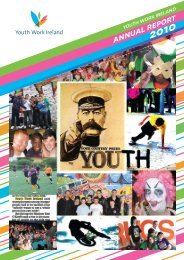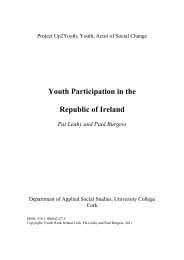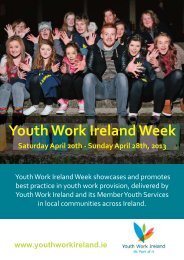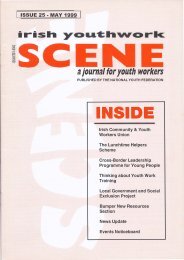Issue 34: November 2001 - Youth Work Ireland
Issue 34: November 2001 - Youth Work Ireland
Issue 34: November 2001 - Youth Work Ireland
You also want an ePaper? Increase the reach of your titles
YUMPU automatically turns print PDFs into web optimized ePapers that Google loves.
see this principle at work in youth services, education,personal social services, and community development.As I have said one of the richest, positive and mostenriching features of Irish social and community lifetraditionally has been the extensive level of voluntaryinvolvement. We see this principle at work in youthservices, education, personal social services, andcommunity development.Voluntary organisations pioneer work which the state maylater take over; sometimes they do work which statutoryorganisations cannot effectively do or simply are notdoing and they act as pressure groups or critics inconnection with statutory services and social needs.Voluntary provided and community based services arenot something imposed from outside by an all embracingstate but are a concrete expression of a progressivesocial and democratic philosophy. One of the interestingfeatures underlined by the working and growth of theseorganisations is the importance of the principle of theseorganisations in caring. Voluntary and statutory action arenot the antithesis of each other. They spring from thesame roots; are designed to meet the same needs andhave the same motivating force behind them. It was thelate and great Lord Beveridge one of the architects ofmodem social policy in Britain who saidexisting effective programmes and initiatives in thecommunity and help strengthen and attend these.One of the more important developments then of the lastthree decades in <strong>Ireland</strong> has been the development ofbroadly based Councils with an overall concern for thewelfare of the town/community in which they live andefforts to plan, initiate and develop new services andimprove and extend existing ones. Constructive andbroader thinking of this kind over the last three decadesor so has led to the development of Social ServiceCouncils/Community Councils/Community ServicesCouncils.These Councils (and there are between three to fourhundred of them in the country) emphasise that they arenot separate organisations and do not interfere with theautonomy of member groups, they consist of theorganisations that make up them. The widening andmaking more sophisticated of the range of personal socialservices has largely been associated with thedevelopment of the Social Services Councils. By comingtogether they improved the quality and impact of whatthey were already doing and progressively undertook newprojects together that individually would have beenbeyond their power."State Action is voluntary action crystallized andmade universal'. Voluntary/statutory co-operation isimproving continually but still has a considerabledistance to go".I have long felt that there should be clearer guidelines andprinciples agreed in maybe something like amemorandum of agreement between voluntary andstatutory bodies at regional level for a period of say fiveyears indicating the services both should provide and therelationship between them.There are a plethora of new special projects, newstructures and funding sources in recent years, many withstrong EU backing. Obviously these are welcomedevelopments but it is an extremely complicated sceneand one where it is quite difficult for voluntary groups tofind their way around. So, for example there are theCounty Enterprise Boards, Development PartnershipBoards, the Leader Programme and its spin offs, as wellof course as the schemes run by the major statutorybodies and special schemes under the aegis of themfocused on new initiatives and experiments.It is still extremely difficult to get any decent funding forthe provision and maintenance of basic core communityfacilities and programmes. While there is provision forvoluntary involvement these initiatives are weighed veryheavily towards statutory bodies or highly organisedinterests and the input and role of voluntary groups will inpractice be small. There is a real danger of the seriousoverlap and wastage of efforts and resources betweenthem. They need to be closely integrated betweenthemsefves and organisational and operationalarrangements need to be worked out urgently. It is alsoimportant that these new agencies/structures look atWhen Mary Robinson was President and continuouslyhighlighted the importance and large amount of voluntarysocial and community work carried out in <strong>Ireland</strong> shedescribed it as 'a virtual black economy of caring'. Overthe past thirty years or so the most important singleadvance in the area of personal social services has beenthe development and acceptance of the concept ofCommunity Care. In general this is taken to mean care inones home either by one's family or the family supportedand helped by visiting social work personnel. This methodof care is contrasted with that given in an institution like ahospital, children's home or old people's home.For avariety of reasons it is said to be preferable to institutionalcare, and indeed, if given efficiently and early mayprevent the need for institutional care altogether. Thebeneficial effects of this policy in the care of the elderly,childcare, care of the handicapped, care of the mentally illand so on are now obvious in this. country. CommunityCare without a caring community is impossible. Mostpeople if pressed will say in an impersonal way that apolicy of this nature is both humane and sensible ... aslong as it does not affect them personally.It is when plans are announced for a scheme near to theirhome that things tend to go wrong. Too often the reactionis "not in our street please". When a community reacts inthat way it is really putting ratable valuation values abovehuman values and community care cannot became areality.Perhaps a more important meaning contained in thephrase "Community Care" is this: The whole communityIrish <strong>Youth</strong><strong>Work</strong> Scene<strong>November</strong> <strong>2001</strong>



